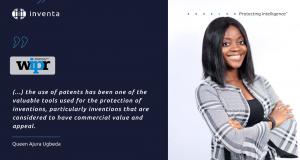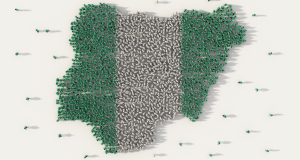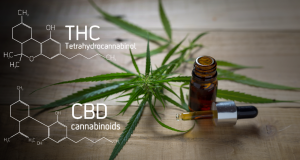Our Team
Queen Ajura Ugbeda, Trademark and Patent Attorney

Quick Biography
Queen Ajura Ugbeda, Trademark and Patent Attorney
Trademark and Patent Attorney at Inventa Nigeria and a qualified Lawyer. Queen acts in procedures related to the protection of Intellectual Property, advising our clients on the best strategies to protect their assets.
Email Queen AjuraDetails
More information about Queen Ajura Ugbeda
Languages
- English
Admissions & Education
- Lawyer registered in the Nigerian Bar Association
- Patent and Trademark Attorney before the Nigerian Intellectual Property Institute
- Bachelor in Law from the Nigerian Law School
- Degree in Law from the University of Benin
Experience & Skills
- Legal Business Management
- Negotiation
- Litigation
- Conflict Management
Related news
Get in touch
Send a message to Queen Ajura
Territory List
There are no results for your search.
- Africa
- Algeria
- Angola
- Benin
- Botswana
- Burkina Faso
- Burundi
- Cameroon
- Cape Verde
- Central African Republic
- Chad
- Comoros
- Congo (Republic)
- Côte d'Ivoire
- Democratic Republic of the Congo
- Djibouti
- Egypt
- Equatorial Guinea
- Eritrea
- Eswatini (Swaziland)
- Ethiopia
- Gabon
- Gambia
- Ghana
- Guinea
- Guinea-Bissau
- Kenya
- Lesotho
- Liberia
- Libya
- Madagascar
- Malawi
- Mali
- Mauritania
- Mauritius
- Mayotte
- Morocco
- Mozambique
- Namibia
- Niger
- Nigeria
- Réunion
- Rwanda
- Sao Tome and Principe
- Senegal
- Seychelles
- Sierra Leone
- Somalia
- South Africa
- South Sudan
- Sudan
- Tanzania (mainland)
- Togo
- Tunisia
- Uganda
- Western Sahara
- Zambia
- Zanzibar
- Zimbabwe
- Africa (OAPI)
- Africa (ARIPO)
- Other
- East Timor
- Macao
- Maldives
- Portugal
- European Patent (EPO)
- European Union Trademark (EUTM)
- International Trademark (Madrid System)
- Patent Cooperation Treaty (PCT)





